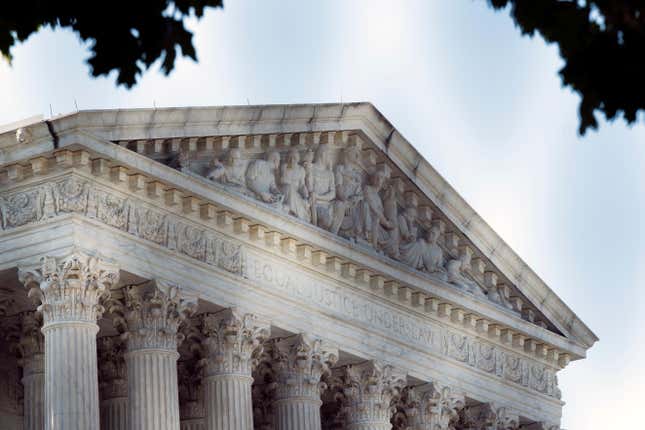
This week, rumors circulated that the Supreme Court might overturn Roe v. Wade, the 1973 landmark abortion case establishing the constitutional right to an abortion, today.
However, after the court handed out its last decision this morning, it became clear that 10 am on June 15th, 2022, would not be moment justices called a time of death for America’s most hotly debated case.
With obvious exceptions, the Supreme Court is notoriously hard to read. Generally, the court releases the majority of its opinions in June or early July. This means we’re likely going to get a decision any day now.
“It’s not Done Inside the Supreme Court.”
In May, Politico published a leaked draft of conservative Justice Samuel Alito’s majority opinion on Dobbs v. Jackson, the Mississippi abortion ban case currently before the court. In his opinion, Alito called to overturn Roe, saying it was “egregiously wrong from the start.”
However, legal experts like Stephen Wermiel, a constitutional law professor at American University Washington College of Law, caution against assuming the leaked draft will be identical to the final opinion.
“The first draft is dated February 10th,” said Wermiel. “I would say it’s 100% certain that there are subsequent drafts. That may not change the outcome…But, it’s not done inside the Supreme Court until... it’s actually released.”
The Fight in Anti-Abortion States Rages on.
As of right now, the constitutional right to abortion still exists. But that’s cold comfort for folks living in states like Texas, which banned abortions after five weeks in September.
“Technically, in Texas, it’s still legal to have an abortion,” said Kamyon Conner, executive director of Texas Equal Access Fund. “But just because you have the right to it doesn’t mean you can access it.”
The majority of abortion seekers who call Conner’s fund are people of color, she said. Many of them are calling about pregnancies after the five-week mark and now need assistance traveling out of state.
“For Black folks in particular… traveling is a luxury,” said Conner. “ Having to take time off work, or chuck some responsibilities that you have in your life. It’s not an option for some people.”
Research looking at the closure of half of Texas’s abortion clinics in 2013 found that increasing the distance folks had to travel for care drastically decreased the number of abortions obtained in the state, according to a Brookings report.
Misinformation following the Texas abortion ban and the Supreme Court news is another huge issue in Texas, said Conner. “People literally think it’s illegal to get an abortion if they live here,” she said.
“I think for Black folks, it’s scary to be pregnant in Texas right now,” said Connor referencing the high rates of Black maternal mortality and morbidity in the state. “It’s a dangerous place right now in Texas for Black women with abortion so far out of reach.”
Outside of the Lone Star State, Attacks on Abortion Access Persist.
In two weeks, Florida is set to enact a 15-week abortion ban.
The ban is particularly troubling for southerns who relied on the state as a “safe haven” for abortion access because of Florida’s strong privacy protections, said Jasmen Rogers, with Floridians for Reproductive Freedom.
“Every year we have seen an amplification of their attacks on abortion in the state,” said Rogers. “When you see attacks like that, they will always disproportionately impact people at the margin, specifically Black people, Black women, trans people.”
In parts of the midwest, restrictions have made abortion inaccessible within state limits.
In Oklahoma, abortion clinics have completely ceased operation because of a new abortion ban passed by the state legislature, according to reporting from the New York Times. And the only abortion clinic left in South Dakota reportedly performed its final abortion last week.
In 2021, anti-abortion legislators enacted more than 100 restrictions on abortion, the highest number of abortion restrictions passed in a single year, according to Guttmacher.
“Roe v. Wade Made Abortion Legal, But Not Accessible.”
It’s hard to argue that if Roe v. Wade is overturned this term, things will not get a whole lot worse. Thirteen states currently have “trigger laws” on the books that would immediately ban abortions once Roe is reversed. And Guttmacher predicts that 26 states are certain or likely to ban abortion if that happens.
But advocates in states where abortion is already out of reach want to make it very clear that while we can’t predict what the court will do, the fight is already at our doorsteps.
“Roe v. Wade made abortion legal, but not accessible,” said Oriaku Njoku, Co-Founder and Executive Director at Access Reproductive Care Southeast. “Regardless of what the decision was going to be, or is going to be, folks are still going to have issues accessing abortions.”

